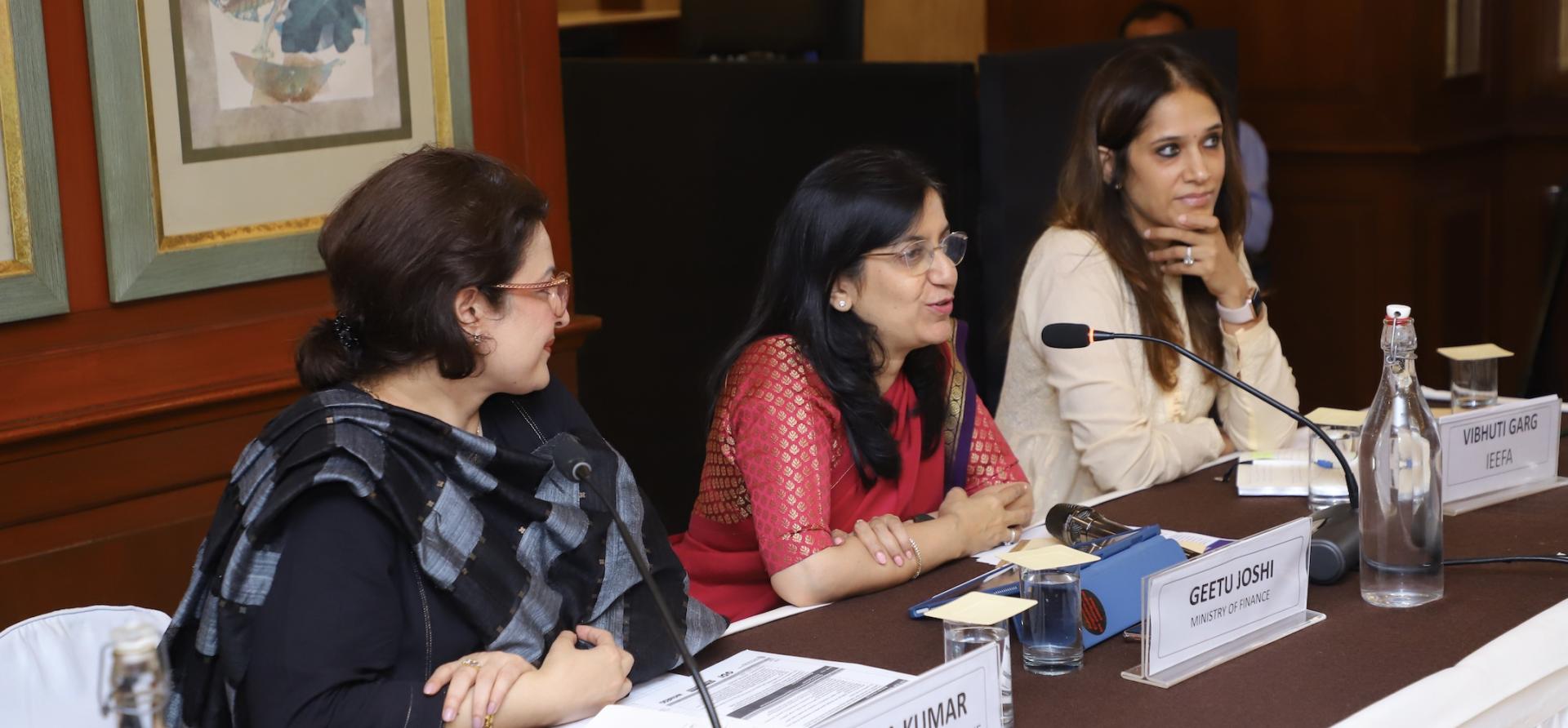Agenda for next 18 months: Roundtable outlines ten actions for policymakers and market leaders for a sustainable finance roadmap in India

Post G20 priorities for India’s sustainable finance roadmap highlighted focussing on ten key actions, citing certain structural and capacity barriers which would need to be addressed to quicken the pace to increase the flows of international and domestic finance for sustainable investments.
Co-organised by India Initiative on Climate Risks and Sustainable Finance anchored by Climate Bonds Initiative, ODI and auctusESG in partnership with IEEFA, the roundtable was opened by Geetu Joshi, Advisor, Department of Economic Affairs, Ministry of Finance who led the Sustainable Finance Working Group (SFWG) of the India’s G20 Presidency. She emphasised India’s successful achievement of the desired results, vital for attaining agenda 2030 and the Paris Agreement goals and emphasised the need now for executing recommendations and cooperating with other countries to achieve shared goals and the three priorities that emerged from the lengthy negotiations.
- To mobilise finance for climate action by attracting resources, involving Multilateral Development Banks, and encouraging private investment in green and low-carbon technologies.
- Expanding the scope beyond climate to encompass all SDGs (Sustainable Development Goals) for the first time by devising an analytical framework aligning financial instruments with social SDGs and improving data related to nature and biodiversity.
- The initiation of a G20 Technical Assistance Action Plan (TAAP) to build capacity for sustainable finance tailored to local needs while safeguarding small and medium enterprises (SMEs) from the disproportionate impact of sustainability reporting obligations.
- Re-imagine Blended Finance
The instrument is a way channel concessional finance but has not met expectations either in terms of volume or accessibility, indicating the need for urgent action. The Roundtable highlighted key principles to enhance effectiveness: avoiding market distortion because of subsidies, supporting the private sector to grow market and attract private resource by minimizing concessionality, and prioritizing long-term sector sustainability. A shift in perspective from subsidies to productivity can also be beneficial. Experts stressed that investments in green activities enhance productivity, and this is an important macro-economic and financial lens.
- Increase resource allocation of Multilateral Development Banks (MDBs)
Indian Presidency has stressed this aspect. MDBs need to enhance their resource efficiency by aiming for 8 to 10 times leverage through strategies like capital increase, risk-taking, programmatic interventions, and utilizing financial mechanisms such as thematic bonds and risk-sharing facilities while also providing technical assistance wherever required.
- Scaling private investments
Both private equity and debt are crucial. However, adapting to economic cycles and supply-demand balance for funds is challenging. Shifting financial incentives, such as through taxes or voluntary markets, can be a means to attract capital e.g., Carbon Border Adjustment Mechanism (CBAM). However, pricing alone isn't the sole solution. Non-pricing elements like regulations and strengthening financial systems will also play pivotal roles. Additionally, IFSCA should be leveraged to attract foreign investment flows.
- Empower MSMEs and Startups
There is a need to match MSMEs’ preferences for short payback periods and adapt banking products to support them. Appropriate funding allocation for startups and leveraging India's technology for decarbonization is an immediate opportunity to capitalise on.
- Tap into Energy Efficiency potential
Energy efficiency and renewable energy have significant potential, but they need a structured market approach and collaboration with specialized NBFCs (Non-Banking Financial Corporation). Similarly, demand from open-access consumers is high, but attracting investors requires addressing factors like soft costs (variable costs) and regulatory clarity.
- Develop a cohesive overarching sustainable finance framework/roadmap
A cohesive sustainable finance framework, like the EU Green Deal is required, the absence of which leads to fragmented efforts and confusion, underscoring the importance of establishing an integrated framework for effective governance and implementation. The efforts undertaken by the Ministry of Finance Sustainable finance taskforce (SFTF) in 2021-22 can provide critical guidance. Sector, national, and sub-national transition trajectories will play an important role, such as those being developed by Niti Aayog.
- Prioritise Capacity Enhancement
There exist varying levels of awareness and capacity within the banking sector regarding ESG, sustainability and climate related issues even as materiality of these to financial institutions is increasingly understood. Banks are at different levels of maturity on these issues. Better alignment between different teams within a bank is required to enhance overall efforts. Besides this, senior management awareness needs to be focussed upon. In-house experts with sector-specific knowledge can supplement traditional banking expertise, ensuring effective navigation of climate risk and sustainability complexities. Banks understand physical risks arising out of climate change as more material than transition risks.
- Prioritise sustainable finance taxonomy development
The financial sector and companies are grappling with uncertainty due to the absence of a clear taxonomy and definitions for sustainable activities. The risk of green washing can be a significant deterrent in lending and investment in sustainable projects, They eagerly await regulatory clarity to distinguish among different types of sustainable (and transition) initiatives.
- Make data comparable
While recent regulations are expected to positively impact the quality and quantity of data reported, persistent challenges exist in data quality, harmonization, and assurance, particularly in the context of ESG and climate considerations. The absence of sector contextualization makes comparing emissions and transition plans across companies difficult.
- Make short and medium term actions clear for financial institutions
In the short term, assess and disclose carbon emissions and grasp climate-related financial risks affecting portfolios and operations. In the medium term, define a clear alignment with India's commitment with Paris and SDG goals , reduce emissions-intensive funding and initiate transition planning and financing.
For a more in-depth overview of the discussions at the event, please refer to this document.
















